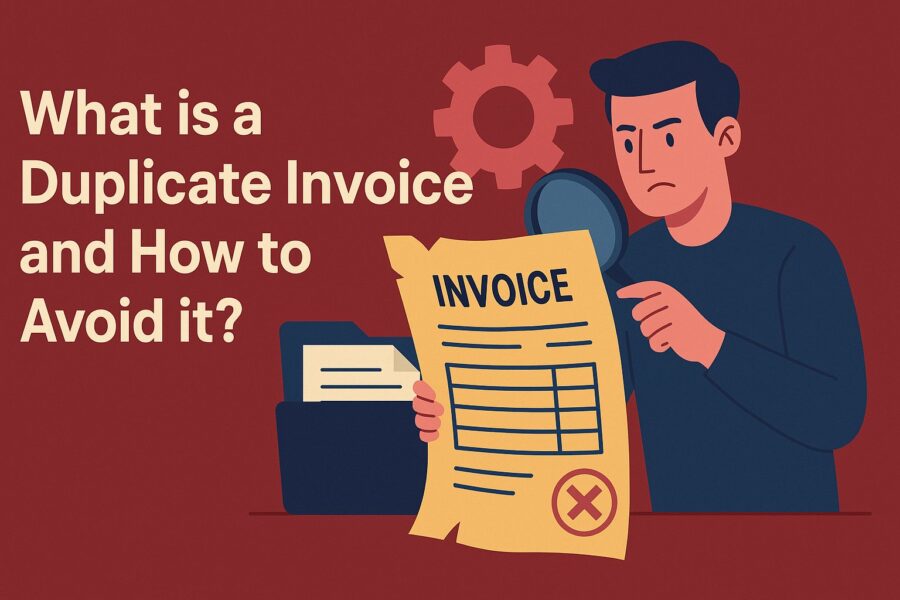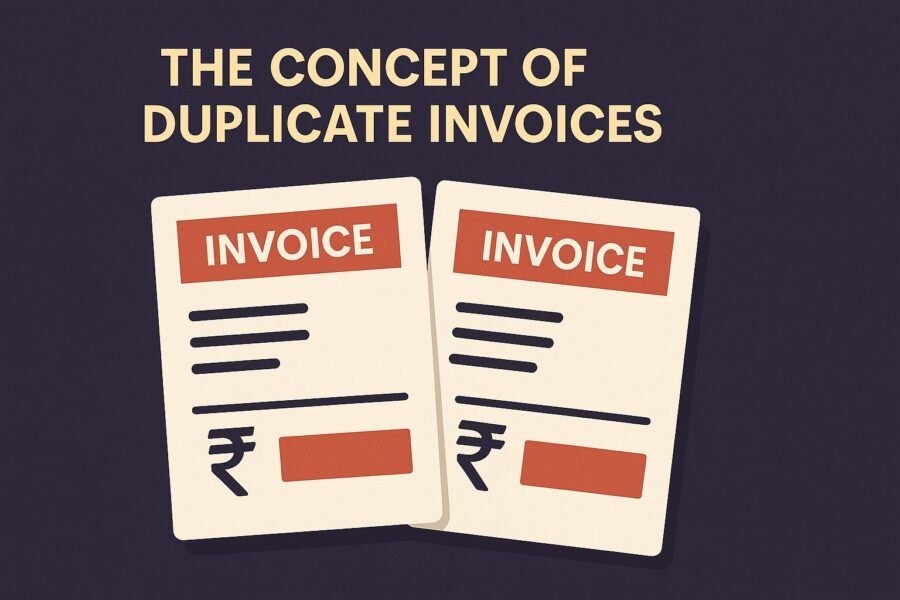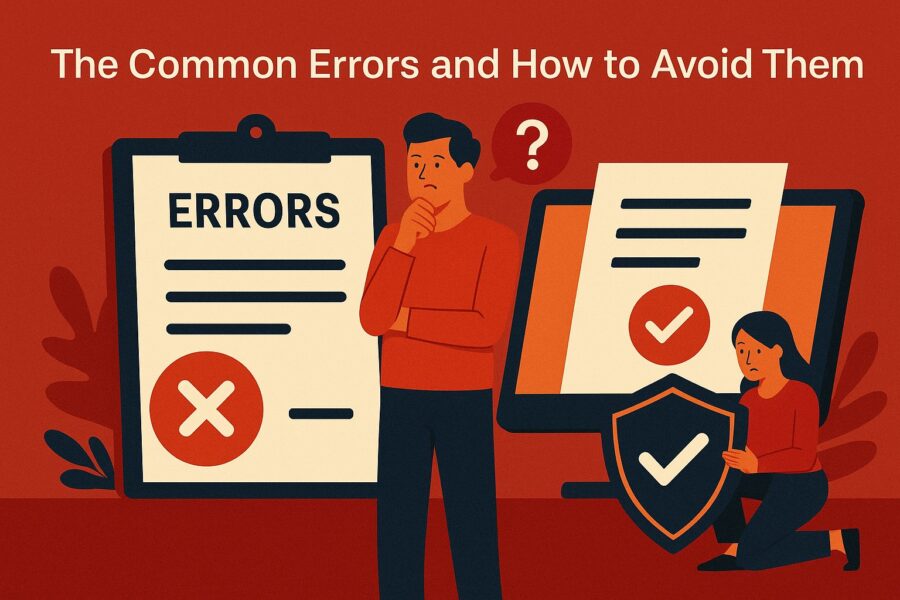What is a Duplicate Invoice and How to Avoid it?
- 12 Nov 25
- 9 mins

What is a Duplicate Invoice and How to Avoid it?
Key Takeaways
- Understanding what is a duplicate invoice is crucial. It refers to the same bill being processed more than once, either accidentally or fraudulently.
- Duplicate invoices often result from human errors, miscommunication between departments, or multiple submission channels.
- They can lead to financial loss, compliance risks, and strained vendor relationships.
- Implementing AP automation tools and clear communication protocols can help prevent double invoicing.
- A duplicate invoice-free future is possible through automation, verification, and streamlined invoice management.
Did you know that invoice errors can drive up processing costs by nearly 20% and cost businesses up to 4% of their annual revenue? Among these errors, duplicate invoices are particularly troublesome. They can disrupt cash flow, delay vendor payments, and reduce overall financial efficiency.
In this blog, we will explore what a duplicate invoice is, the risks it poses to your business, and practical steps you can take to prevent it, ensuring smoother, more accurate financial operations and stronger vendor relationships.
The Concept of Duplicate Invoices

Within the industry, duplicate invoices are also called 'double invoices’. They result when a singular bill is processed more than one time. This potentially leads to discrepancies in the finances. They can show up in different forms, including:
- Identical invoices which are submitted multiple times,
- Invoices which show minor differences,
- Invoices are sent via different channels.
Businesses can recognise and deal with the issue of double invoices effectively if the nuances are understood well. Further, let’s dive into the different scenarios which may lead to cases of double invoices and the triggering causes behind them, which may be either intentional or accidental.
Duplicate Invoices As a Result of Fraudulent Measures
Not all duplicate invoices are accidental. Some arise from intentional fraud. Fraudsters may exploit minor modifications to submit multiple invoices for the same transaction, tricking the accounts payable system. A common tactic includes changing just the invoice date, number, or vendor details to make the duplicate appear legitimate.
For instance, a vendor might submit a second invoice for the same service, altering only the invoice number or date to bypass detection. These manipulations can lead to duplicate payments, financial loss, and disrupted audit trails, making it essential for businesses to implement strong invoice verification and approval systems.
Unintentional Duplicate Invoices: The Common Errors and How to Avoid Them

Apart from certain duplicate invoices resulting from fraudulent activities, several result from genuine fraud-free errors. Such common errors may include:
Simple Data Entry Errors
Simple data entry errors may very well lead to duplicate invoices when incorrect/incomplete information is entered into the accounting system. For example, if a business processes 5,000 invoices monthly and even 1% are duplicates due to typos in invoice numbers or dates, that is 50 duplicate entries per month, 600 annually, which could result in lakhs of rupees in overpayments.
This may be a result of human error, a jarring lack of standardised data entry protocols, or dissatisfactory training of staff. The implementation of automated data capture/validation devices shall help significantly minimise errors of such nature.
Miscommunication Between Various Departments
Miscommunication between departments, like accounts payable, procurement and finance, can result in double invoices. When separate groups are not aligned on the status of payment, invoice approval stages, or vendor communications, it may lead to several invoice payments being processed for a single invoice.
Suppose, a mid-sized Indian company with decentralised teams recently reported that out of 10,000 invoices processed annually, nearly 150 were duplicated due to poor inter-departmental communication.
That is a 1.5% error rate. If the average invoice value is ₹20,000, that could mean accidental payouts of ₹30 lakhs in a year.
However, regularly conducted inter-departmental meetings, an effort to maintain clear communication protocols, and centralised invoice tracking can assist in mitigating this issue.
Invoices Being Submitted Via Different Channels
Invoices which are submitted via multiple channels, including postal mail, email and online portals, may be prone to the risk of duplicate payments. If the invoices are received via various channels without proper tracking or verification, it's natural for the accounts payable team to end up processing payments multiple times.
The way to avoid this situation is to implement a centralised invoice receipt as well as a processing system that can help seamlessly streamline invoice management. This will positively reduce the risk of duplicates in the future.
Not Being Able to Resolve Invoice Disputes
Say, there were issues with the “quoted amount” / other fields on the invoice. In case they have not been resolved quickly, the client shall resend the same invoice. This may lead to double invoicing as well as payment.
To avoid this scenario, disputed invoices must be marked as 'pending'. They should be flagged to the vendor as well as the accounts payable team so that any discrepancies are addressed before processing. Otherwise, the invoice is likely to be lost in the 'pending pile'. This shall result in a double payment when the rectified invoice arrives.
Adjusted/Cancelled Invoices
Vendors may end up cancelling invoices or resending them with little changes. If sent over to the concerned party through email, they will have to resend a new email with the latest invoice.
However, if the accounts team does not mindfully document the invoice, duplicate invoicing may result. Minute changes reflected in the updated invoice are prone to being overlooked, even at the time of duplicate payment audit. The possibility of double invoices occurs when the adjusted invoice is resent over by mail. Due to a difference in timeline, one may not be able to identify the duplicate reports in future.
Example
An invoice may have been sent through the medium of email and then mailed again, in paper form. This may lead to a case of unintentional double invoicing. The issue may also result from unforeseen glitches in the system or cases of oversights in the invoice tracking process.
Being aware of such common operational obstacles is crucial for businesses so they can develop robust processes and systematic checks which minimise inadvertent duplication risks.
Impact of Duplicate Invoices on Financial Health
Although Indian SMEs could potentially process up to ₹10,00,000 (approximately) every month in duplicate invoices, the impact of duplicate invoices extends far beyond financial loss. They trigger a cascade of operational inefficiencies, from inaccurate financial statements to hampered management of cash flow.
If invoices are formulated multiple times, it does not just lead to direct financial loss but also initiates a loop of unending administrative burdens. This may include:
- Time-intensive reconciliation processes
- Strained relationships with vendors
- Harm to the reputation of the enterprise, etc.
Frequent cases of double payments also point towards deeper issues in the department of financial controls, exposing the business to:
- Increased audit risks
- Compliance issues under the Indian accounting standards as well as the GST regulations.
It is important to recognise the complete spectrum of such impacts so businesses can appreciate the importance of accurate invoice management more.
💡For your bill payments and tracking business transactions, use the PICE App.
Handling and Resolving Duplicate Invoices
The resolution of a duplicate invoice shall typically involve certain steps. Once the Accounts Payable team recognises a potential invoice duplicate, the documents are verified for authenticity. The invoices are compared against existing records, like:
- Purchase orders
- Previously-paid invoices
If the invoice’s nature is confirmed as a duplicate, the following step is to rectify the mistake with the respective vendor. This may involve getting in touch with the vendor with the aim of clarifying the error. Also, ensuring that no payment is made on the duplicate invoice is essential.
Error documentation and communicating the same within the internal finance team are also important to avoid similar scenarios in the future. This shall help maintain more accurate records.
In some cases, especially if the duplicate has been paid, it may be necessary to prepare a refund/credit with the vendor. The process further highlights the importance of meticulous record-keeping and effective communication in managing AP smoothly.
Automation as a Medium to Avoid Duplicate Invoices
Getting rid of and avoiding duplicate invoices altogether is essentially about boosting the accuracy and efficiency of the accounts payable system. AP automation devices become important in these scenarios.
AP automation solutions offer features including:
- Automatic invoice matching to the concerned purchase orders
- Real-time invoice status tracking
- Alerts for possible invoice duplicates
Through the integration of such technology, businesses can actively manage their invoice workflow. This will automatically reduce and minimise the likelihood of invoice duplicates by a huge margin. By opting for this preventative approach, businesses will not only save time and resources but also fortify their financial operations against potential fraud/errors.
Is a Duplicate Invoice-free Future Feasible?
Having a thorough understanding of and being able to manage duplicate invoices is crucial for businesses, particularly in maintaining accurate financial records. A strategic approach towards avoiding errors is to employ AP automation tools. Such solutions provide effective invoice-matching features, real-time tracking facilities, and even alerts for duplicates. They shall help safeguard your business against both unintentional as well as fraudulent invoice duplicates.
With such a smart approach towards avoiding errors in invoicing, a future free of double invoices is feasible!
Conclusion
We hope you now have a better idea about what a duplicate invoice is. To sum it up for you, duplicate or double invoices have far-reaching consequences for business entities, from triggering financial losses to posing operational inefficiencies.
By understanding the causes, like data entry errors and miscommunication, and implementing robust invoice management systems, companies shall be able to prevent duplicate payments.
Effective invoice management is important for maintaining financial integrity, reducing audit risks, and ensuring overall seamless operations. Proactive measures like automation tools may also help businesses avoid the pitfalls of double invoices and optimise their financial processes.
 By
By 
















